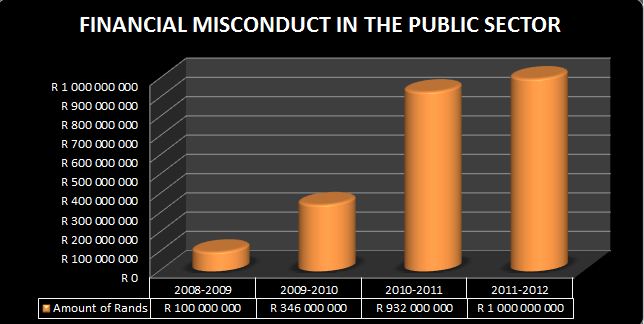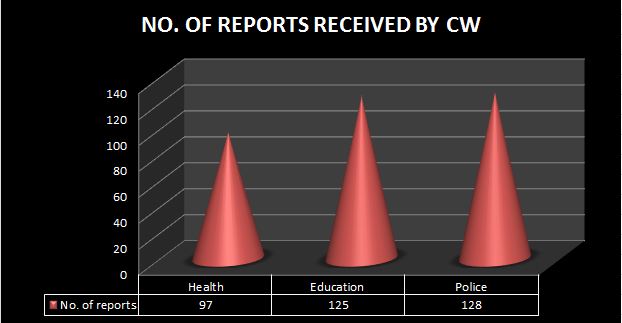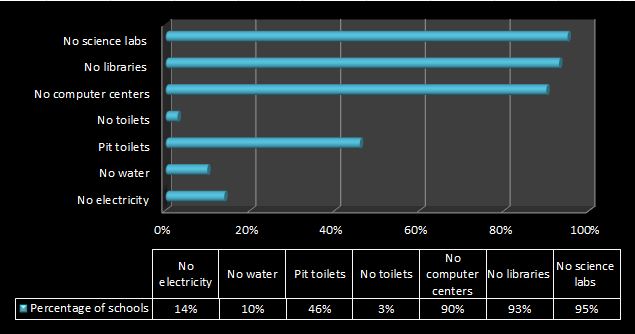|
Getting your Trinity Audio player ready...
|
 By Kavisha Pillay
By Kavisha Pillay
In a letter published in The Star newspaper earlier this month, President Jacob Zuma congratulated the public servants of South Africa who, he said, were improving the country. While it is commendable that many are indeed hard-working and honest individuals who strive to build the nation, the president paints a somewhat fantastical picture of the public service.
Facts and figures
It has been reported that since 1994 – in the proceedings of the National Assembly on 15 August 2012, no less – that R385-billion has been lost to corruption in every sector of the government. And at the beginning of February this year, the Public Service Commission (PSC) expressed its fears that financial misconduct in the public service for the 2011-2012 financial year could hit R1-billion.
Financial misconduct is generally open to interpretation because of the dynamic nature of cases that are investigated, however, and the PSC has also found that there is lack of understanding of the legislation that covers misconduct.
As a result, incidents of misconduct do not get the attention they require, and as a consequence, an environment is created that opens up departments to corruption. Totting up the figures for financial misconduct in the public service since 2008, it is clear there has been an alarming increase in the amount of money that has been abused by civil servants.
At a roundtable discussion on financial misconduct held in February, the PSC noted that the findings over the years had shown that there were weaknesses in risk management and control systems in departments. It stressed that the failure to put in place adequate systems would continue to undermine efforts to deal effectively with corruption.

In its 2011 presentation to the Portfolio Committee on Justice and Constitutional Development, the Special Investigating Unit (SIU) said it was investigating 588 procurement contracts in the public sector to the value of R9.1-billion, of which it had found that 43 procurement processes, amounting to R1.4-billion, were irregular. The unit was also probing 360 matters relating to conflict of interest valued at R3.4-billion
In his letter, the president said there had been “meaningful achievements” in the health, basic education and police sectors. But based on the reports received by Corruption Watch and investigations done by the SIU, this is not the full picture.

Health
Corruption in the Health Department has been reported widely in the media, and the amount of money squandered by public servants in the sector is shocking. Zooming in on the Eastern Cape health department, an investigation by the SIU, the South African Revenue Services and the Asset Forfeiture Unit, released in February, illustrated the gross amount of graft in the department. The investigation discovered that 544 department workers were suspected of being ghost employees, 8 034 workers were directors of active companies, and a further 929 workers were listed as direct suppliers to the department.
In another case, in 2010, Deputy President Kgalema Motlante, then acting president, signed a proclamation authorising the SIU to investigate senior officials in the Gauteng health department who were awarded tenders worth R1-billion. The unit stated that it was investigating a current chief director, a former head of department and a former chief financial officer who allegedly made improper payments of R15.3-million, R1.2-million and R681 916 to service providers.
Education
Moving on to the basic education sector, a damning analysis by Equal Education, published on 13 November 2012, illustrated the shocking truth about the state of public schools in the country. It noted that out of 24 793 public schools in South Africa, 14% did not have electricity and 93% had no libraries.
In the country’s 2013-2014 annual budget, education has been allocated R233-billion, an increase of 5% over the previous financial year. However, as figure three shows, it is evident that a great deal of the money set aside to improve the education system has gone somewhere other than to public schools.
According to reports received by Corruption Watch, about 40% of graft in schools involves the embezzlement of funds by principals, school governing bodies, or school financial officers. A further 16.2% relates to corruption in procurement processes.

In 2010, the SIU began investigating the Eastern Cape department of education after allegations surfaced of fraud, corruption and maladministration relating to the awarding of tenders involving the scholar transport system, the school nutrition system and more.
The unit found that an official captured unauthorised payments worth R1.4-million for no services rendered to a company owned by a close relative, and nine officials were dismissed on various charges relating to corruption.
Police
When it came to the police, Zuma stated that the turnaround time for service delivery had improved, as well as the average time taken by police to respond to calls for help. But has bribery in the police lessened?
An analysis by the Human Sciences Research Council and the South African Social Attitudes Survey noted that South Africans viewed the South African Police Service (SAPS) as the most corrupt body in the country, it was reported in June 2012.
Reports regarding the police comprised 5.1% of the total reports received by Corruption Watch last year, in which the public highlighted issues such as:
- SAPS intimidating vulnerable people with fake “criminal charges” unless a bribe is paid;
- Accepting bribes to make criminal charges or dossiers disappear;
- Use of SAPS property for private benefit; and,
- Nepotism and bribery in the appointment of police officers to certain positions.
According to the 2011-2012 SIU annual report, the unit was asked to investigate irregularities in tender and procurement processes in the SAPS. It identified 88 members who were doing business directly with the state, and found irregularities in the building and renovation of 33 police stations, exceeding R330-million.
The unit also identified wrongdoings in procurement processes, control weaknesses, irregular expenditure and poor project management, which all resulted in fruitless and wasteful expenditure in four contracts worth R287-million, R18-million, R900-million and R503 000 respectively. Investigations regarding these matters are under way.
Hani’s words echo loudly
On 10 April, South Africa marked the 20th anniversary of the assassination of struggle veteran Chris Hani. In an interview eight days before his murder, Hani called for a culture of service in the country. He envisioned a nation where nurses were guided by ethics of care, teachers by ethics of learning, and police by ethics of community safety. He noted that South Africa faced a new enemy, and that enemy was corruption. “We in the party have been discussing how we should cut down on salaries of ministers, of parliamentarians, so that if you are in Parliament in Cape Town, you actually rent a flat like everybody,” he said.
The unfortunate truth is that Hani’s vision of a culture of service has turned into a culture of corruption. Public servants need to become accountable for their actions, some of which are becoming increasingly devastating to the country.
But there are also many employees of the state who take the fight against corruption to heart, and are committed to accountable and transparent processes.
"We take heart from the number of people in the public sector who are reporting cases of corruption to us. These are people who have responded to Hani’s vision and who are ashamed to be associated with government institutions in which corruption is rampant – they are among our best hopes for reducing corruption," says Corruption Watch director David Lewis.
In closing his letter, Zuma said: “We thank all our hard-working public servants. Keep up the good work and let us continue building a responsive, effective and caring government.”
The president painted a picture of a public service that seems clean on the surface – but if you take a closer look, the rot of corruption is clearly evident.









